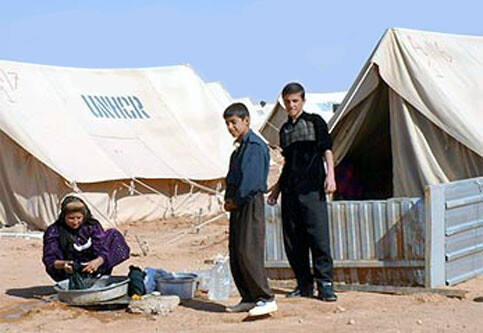United Nations High Commissioner for Refugees 28 November 2003

Refugees in the no man’s land between Iraq and Jordan are ill-equipped to cope with the approaching winter (Photo: UNHCR/P.Kessler, 2003)
GENEVA — The UN refugee agency has urged governments in the Iraq region to find solutions for hundreds of refugees facing harsh winter conditions near the border between Iraq and Jordan.
UNHCR estimates that 1,800 people are living in refugee camps in eastern Jordan. More than half of them have been stuck in the no man’s land between Iraq and Jordan since April, unwilling to return to Iraq yet unable to enter Jordan.
The government in Jordan has already accepted 386 Palestinians with Jordanian spouses. Of the 427 Palestinians who remain in the border camps, most have Iraqi resident documents, 14 hold Egyptian papers while three have Lebanese travel documents. “Jordan has set a positive example by accepting almost half the original group,” said UNHCR spokesman Kris Janowski at a news briefing in Geneva Friday. “Now a solution must be found for the rest.”
He noted that Jordan already hosts the world’s largest group of Palestinian refugees, and that other states in the region can help share the burden.
“It is vital that other Arab and non-Arab countries share the burden by offering them temporary residency so that they might get employment and access to social services until a more durable solution is found,” said Janowski.
Many Palestinians in the border camps have said they wish to go to the West Bank and Gaza, as well as to Israel. The UN refugee agency said it was ready to discuss the issue with Israel and the Palestinian Authority. It also urged Egypt and Lebanon to permit entry to individuals holding their travel documents, adding that if regional options fail, resettlement outside the region will be considered.
Meanwhile, the situation is getting more precarious for those who remain in the border camps, including many Iranian Kurds who fled Al Tash camp in Iraq. They are ill-equipped for the approaching winter after living in canvas tents for the last seven months.
To help them cope, UNHCR has replaced the tents that were first erected in April and provided an additional mattress for each person so that they now have two mattresses to help insulate them from the ground. The agency has also given out three additional blankets so they now have five blankets per person, and provided new heating/cooking stoves to keep the refugees warm.